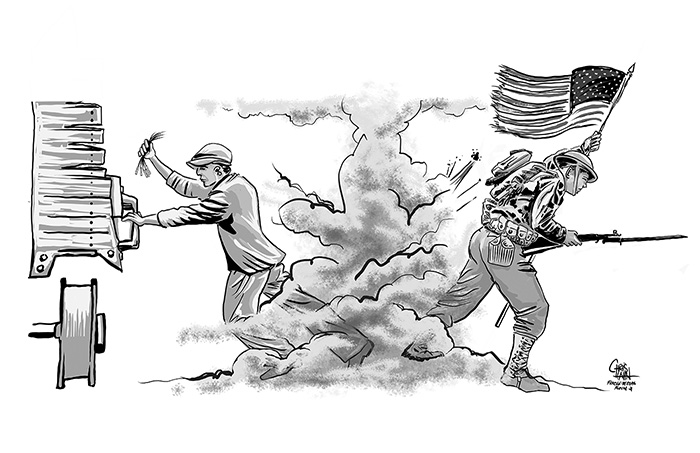Young boys and small towns
Published on December 7, 2021 at 4:23pm GMT+0000 | Author: Chad Koenen
0
Rod Bernu
Special to the Dispatch
Sundays were boring times for young boys in small towns. On an unusually cold 1942 February day, two months after the Japanese bombed Pearl Harbor, some of the 15 and 16-year-old New York Mills town boys who hung around together were sitting on a bed of straw inside a cattle car (the clubhouse) that was parked on the towns railroad siding track next to the stock yard. As usual, they were taking turns puffing on their last Avalon cigarette waiting for their two eleven-year-old neighbor boys who they send with a forged note to purchase more cigarettes.
Mr. Winergratoff, the Jewish owner of the only store in town that was open on Sunday squinted over the rim of his eyeglasses and suspiciously studied the look on Paul’s face as he asked “Is this for your father?” Without hesitation, Paul answered, “Yes, it’s for my dad.” Semi-satisfied, he took the nickel and handed Paul the pack of Avalons.
Back in the box car, the older 15 and 16-year-old town boys were not talking about girls while they waited for their “gophers” to return with the fresh cigarettes. Orlin, the leader of the group said, “Do you guys know what the Japs did in the Hawaiian Islands?” “Yeah,” Jimmy said, “They bombed the hell out of our ships and President Roosevelt declared war on Japan; and it’s going to be the Japs with Hitler and us with the British, French and Soviet Union.”
“How do you know all that?” asked Kenny. Orlin answered and said. “Mr. Olson, our history teacher, was in World War One so he knows what is going on in the world. He said that it could be a long war. Who knows, maybe we’ll end up fighting in it before it’s over.” “Hell Ya, I’m ready now,” said Kenny! “Don’t talk stupid, stupid,” said Orlin, “With your eyesight and those bottle glasses you’ll be turned down and stay home to keep the girls company while the rest of us do the fighting!”
Orlin suddenly pulled out his pocket watch and said, “The twelve o’clock freight train is due pretty soon.” The day before, the older boys had broken into a caboose that was parked overnight on the siding track and stolen some dynamite caps. They jumped out of the box car and quickly spaced half-a-dozen caps on the tracks ready for the train that would roar through town sixty miles an hour.
They had just finished their job when Johnny spied crazy Carl. “Hey, speaking of soldiers look who is walking this way.” Carl had been shell-shocked in World War One and was always drunk on white lightning. Orlin said, “Call him over here and offer him a cigarette. Let’s see what he does when the dynamite caps go off.” “You’re as crazy as he is,” said Paul, “He might go off his rocker and kill someone.” “Aw, baloney, let’s do it,” said Orlin.
The old coal burner was now visible, about a half mile away. They all stood and waited as Orlin offered Carl a cigarette and helped him sit down next to the water tank only yards away from the dynamite caps. The train sped by and suddenly a deafening “KABOOM, KABOOM, KABOOM, KABOOM, KABOOM” filled the air as the caps exploded.
Carl, engulfed in smoke, jumped up and ran head-first into the side wall of the water tank. He fell backwards to the ground, out cold. As the boys jumped up and down laughing, tears streaming down their eyes, Orlin said, “Woe, we’ve got to get out of here. Mr. Johnson, the yardmaster, will be coming out of the depot as soon as the last car clears the tracks.”
The next day, they learned that Carl was O.K. Johnny had overheard one of Carl’s drinking buddies at the local Coop store telling of how Carl had woken up Sunday afternoon on a wooden bench inside the railroad depot with terrific headache and a knot on his forehead the size of an egg. Carl said, “That he had a dream that he was once again in a foxhole in France and bombs were going off all around him!”
The war changed the commerce and activity in our small town. The mood of the people became more serious and many young men, if not drafted, volunteered to serve in our armed forces. After 1942, WPA projects slowed down and new opportunities for employment opened in defense plants and commerce. Many families left our town and moved to Minneapolis, St. Paul, and other west coast states because workers were in demand for the war effort.
Even though most had not realized it, especially the younger ones, it was to be a time of great change in our country and our lives unlike anything that our town boys had ever imagined. Almost overnight the older town boys were fighting for their country; and the younger town boys did their share in the war effort by filling in for their fighting brothers and friends working on local farms and town businesses. Such was the life of the “Town Boys” in New York Mills, Minnesota during World War-Two.

